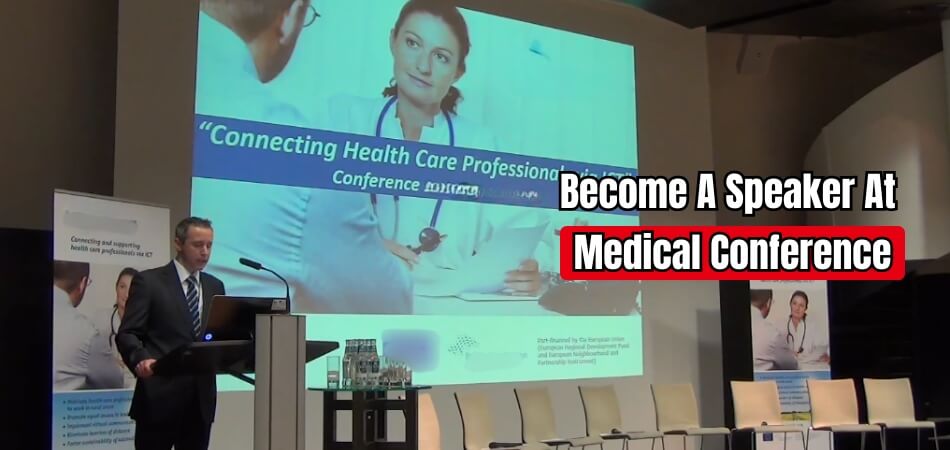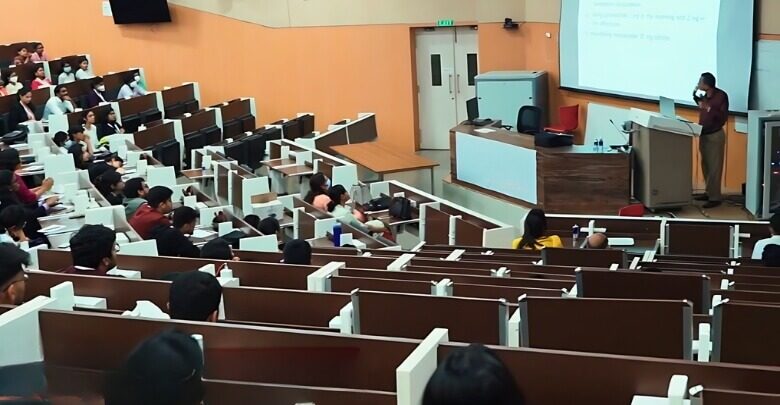The opportunity to speak at a medical conference can greatly raise your professional profile and expand your network within the healthcare industry. It provides an ideal platform to share your insights, and research, and influence your peers and industry leaders. Since such platforms have a great deal of impact and opportunities, you might wonder, “How can I become a speaker at a medical conference?”
You don’t need to worry because being a speaker at a medical conference is an easy process. Simply start by preparing a formal proposal or abstract that aligns with the event’s theme and showcases your expertise. Submit this proposal through the conference’s formal call for speakers by following all guidelines and deadlines.
Additionally, you can increase your visibility and chances of selection by networking with past speakers and committee members. Would you like to learn more about this topic? If so, then continue reading our detailed article.
What Role Do Medical Conference Speakers Play?
Speakers at medical conferences share their expertise and knowledge with conference attendees. They provide information about recent advancements and research. Their presentations help bridge the gap between theory and practice in medicine.

Speakers contribute to their peers’ professional development by joining a medical conference. They encourage discussion and collaboration among healthcare professionals. In this way, the exchange of ideas can lead to innovations and improved patient care.
They also act as mentors and role models for aspiring professionals, which heightens the event’s credibility and prestige. Engaging with these experts can inspire attendees and bring motivation to pursue further education and research in the field. Their guidance and insights often shape the future directions of medical practices and innovations.
What Motivates You to Speak at a Medical Conference?
Speaking at a medical conference is a worthwhile experience that offers plenty of advantages. This event motivates speakers by allowing them to share insights, contribute to the medical community, and grow as professionals. The following are some key motivations for speaking at such events:
- Professional Recognition: Being a speaker increases your standing among peers, showcasing your expertise on a respected platform. This visibility often leads to more opportunities in your field.
- Knowledge Exchange: Presenting at conferences allows you to share your research and learn from others. This exchange is necessary for advancing medical science and patient care.
- Networking Opportunities: Conferences connect you with other professionals who share your interests and challenges. These connections can be invaluable for future collaborations and career growth.
- Skill Development: Preparing and delivering a presentation develops your communication skills. It’s an excellent way to practice making complex information understandable and engaging.
- Influence and Impact: Your findings and perspectives can influence clinical practices and healthcare policies. The potential to make a significant impact motivates many to take the stage.
- Personal Satisfaction: A successful presentation and well-received feedback are deeply satisfying experiences. It reaffirms your contributions to the field.
There are a lot of benefits to being a speaker at medical conferences, from personal development to professional advancement. Especially in Canada, you can expect to avail the most benefits from networking to career building. The Canadian medical conferences bring great opportunities for international attendees. If you take advantage of this opportunity, your career can change and your influence can grow.
How Can I Become a Speaker at a Medical Conference?
Being a speaker at a medical conference is a prestigious milestone for any healthcare professional, and luckily the procedure to become one is quite simple. You can follow these steps to make your application stand out and become a speaker at a medical conference.
Step 1: Be Familiar with the Conference Theme
Before drafting your proposal, research the conference theme thoroughly. Understanding the theme helps you tailor your presentation to meet the audience’s interests. It ensures your contribution is relevant and engaging. Aligning your topic with the conference theme increases the chances of your proposal being accepted.
Step 2: Prepare a Compelling Abstract
Your abstract should clearly articulate your unique perspective. Highlight the value your presentation adds to the conference. It should emphasize your expertise and its relevance to the theme. A well-crafted abstract captures the attention of the selection committee.
Step 3: Follow Submission Guidelines
Ensure your proposal adheres strictly to the submission guidelines. Pay attention to formatting, word count, and deadlines. Following these details demonstrates professionalism and respect for the organizers. It also prevents your proposal from being disqualified due to simple mistakes.
Step 4: Submit Through Official Channels
Submit your proposal through the conference’s official channels. This usually involves using an online submission portal or sending an email. Make sure to receive a confirmation of your submission. This confirmation ensures your proposal has been received and is under review.
Step 5: Network with Industry Professionals
Increase your visibility by networking with well-known conference organizers and past speakers. Building relationships with committee members can provide valuable insights. These connections may give you a better understanding of the selection process. Networking can also enhance your reputation within the community.
Step 6: Prepare for Response
Be ready to respond to any follow-up questions from the conference organizers. This shows your commitment and enthusiasm for participating. Being prepared can also help clarify any points from your proposal. A prompt response can positively influence the selection committee’s perception of you.
Step 7: Practice Your Presentation Skills
Once accepted, practice your presentation skills to ensure you deliver effectively. Rehearse in front of colleagues or friends for constructive feedback. This practice will help you become more comfortable with your material. Strong presentation skills will engage your audience and enhance your message.
By following these steps, you establish yourself as knowledgeable and dedicated to contributing to a medical conference’s ongoing discussions. Additionally, engaging in networking with speakers at medical conferences allows you to share your expertise and make a significant impact on the medical community.
How to Submit Your Proposal Effectively?
Submitting your proposal effectively is crucial for getting selected as a speaker at a medical conference. Follow these steps to ensure your submission stands out and meets all requirements.
Understand the Submission Process
Familiarize yourself with the submission process outlined by the conference organizers. This may include using an online portal or email for submission. Knowing the process helps prevent mistakes and ensures your proposal reaches the right people. Pay attention to deadlines and any specific instructions provided.
Adhere to Formatting Guidelines
Ensure your proposal follows the formatting guidelines specified by the conference. This includes font size, spacing, and layout. Adhering to these guidelines demonstrates professionalism and respect for the organizers’ preferences. A well-formatted proposal is easier to read and review.
Double-Check for Errors
Before submitting, thoroughly review your proposal for any errors or typos. Mistakes can undermine the quality of your submission and distract from your message. Have a colleague or mentor proofread it to catch any oversights. Submitting a polished proposal increases your chances of being taken seriously.
Submit Early
Aim to submit your proposal well before the deadline. Early submissions allow time for any technical issues that may arise. It also shows your eagerness and commitment to participating in the conference. Being proactive can set you apart from other applicants.
What Are the Common Barriers to Becoming a Speaker at A Medical Conference?
Speaking at a medical conference can be a prestigious opportunity, but many professionals face challenges. These barriers can range from lack of experience to not knowing the right people. Understanding the advantages of speaking at medical conferences is the first step toward overcoming them and securing a speaker position. Here is a detailed explanation of it.
- Limited Professional Visibility: Emerging professionals may not be well-known in their fields. Increasing visibility through publications and networking can help overcome this barrier.
- Lack of Previous Speaking Experience: New professionals might feel uncomfortable due to limited speaking experience. Gaining practice through small workshops or local meetings can build confidence and skills.
- Insufficient Research Credentials: Some may feel their research isn’t extensive enough. Collaborating with established researchers can increase your work’s credibility.
- Narrow Specialization: A highly specialized focus might limit opportunities. Broadening your research scope can open more doors to diverse conferences.
- Complex Submission Processes: The proposal submission process can be daunting. Seeking guidance from past speakers can clarify these procedures.
- Strict Selection Criteria: Rigorous criteria may deter new speakers. Customizing each proposal precisely to meet these standards can improve acceptance chances.
- Timing and Deadlines: Missing submission deadlines are common. Setting reminders and starting preparations early can prevent this issue.
- Geographical Limitations: Location can restrict opportunities. Exploring virtual speaking roles or regional conferences can ease geographical constraints.
Tips for Crafting an Engaging Presentation for a Medical Conference
Delivering a presentation at a medical conference can be a career-defining opportunity, so it’s essential to engage your audience effectively to make a lasting impact. Here are some tips for crafting a presentation that catches the attention and helps to inform:
Start Strong
Capture attention from the start with a compelling fact or question. This sets the tone and engages listeners immediately. Be sure your opening relates directly to your core message. It builds anticipation and interest when you start strong.
Simplify Complex Information
Use simple language to explain complex concepts. Visual aids like graphs and images can clarify difficult points. This helps attendees grasp and remember your message. Be sure every slide is clear and easy to understand.
Tell a Story
People connect with stories more than raw data. Structure your presentation around a narrative arc. This makes your content more relatable and memorable. Use real-world examples to illustrate your points.
Interact with Your Audience
Pose questions to the audience to keep them involved, using polls or asking for hands-on responses intermittently. With this interactive session, you’ll gain immediate insight through feedback, while maintaining a lively and engaging environment.
Conclude with Impact
End with a strong summary of key points. Offer a clear call to action or a thought-provoking takeaway. Be sure your conclusion reinforces your presentation’s purpose. Leave the audience reflecting on something memorable.
Frequently Asked Questions
If you’re interested in speaking at a medical conference, understanding the process is crucial. These frequently asked questions provide helpful insights into becoming a conference speaker. Each answer will guide you on what to expect and how to enhance your chances of selection.
Can I Submit Multiple Proposals for Different Topics?
Yes, you can submit multiple proposals if you have expertise in various relevant areas. This showcases your versatility and increases your chances of being selected. However, make sure each proposal is well-developed. Each one should align with the conference themes and objectives to have a better chance of acceptance.
What Role Does the Selection Committee Play in Choosing Speakers?
The selection committee evaluates all submitted proposals based on several factors. They consider relevance, clarity, potential impact, and alignment with the conference’s objectives. Their goal is to curate a balanced program that addresses diverse perspectives and interests within the medical community. Understanding their criteria can help you tailor your proposal effectively.
Is There a Recommended Length for My Presentation?
Yes, it’s essential to check the conference guidelines for specific requirements. Generally, presentations range from 15 to 30 minutes. This timeframe allows for a detailed exploration of your topic and some meaningful interaction with the audience during the Q&A session. Adhering to these guidelines is important for a smooth presentation.
Should I Include References or Citations in My Speaker Proposal?
Absolutely! Including relevant references or citations adds credibility to your research or clinical insights. Make sure your citations are current and from reputable sources within the medical community. This demonstrates thoroughness and strengthens your proposal significantly.
How Can I Stay Updated on Upcoming Medical Conferences and Their Call for Speakers?
Staying updated is crucial for aspiring speakers. Subscribe to newsletters from medical associations and follow relevant organizations on social media. Regularly check conference websites for announcements and updates about calls for speakers. Networking with colleagues can also provide valuable insights into upcoming events and opportunities.
Bottom Line
An opportunity to speak at a medical conference can significantly advance your career. It’s a pathway to sharing valuable insights, as you ask yourself, “How can I become a speaker at a medical conference?”
Your chances of being selected increase if you prepare a persuasive proposal and follow the submission guidelines. Having access to industry leaders and continuously learning are key components of following this path successfully. Take on this challenge to influence and shape healthcare’s future. With each step forward, you expand your expertise and create a bigger impact within the medical community.







